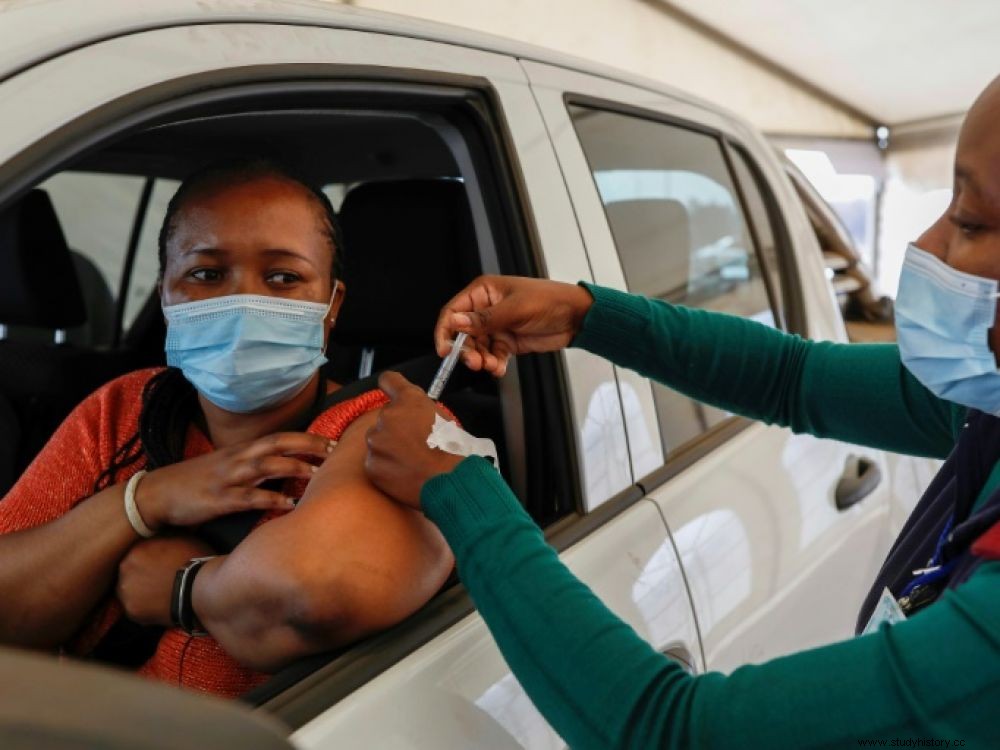The AFRICA PRESS REVIEW resumes this week. In summary, the announcement of the very first underwater museum on the continent in Kenya, biometric technologies perceived as the guarantee of transparent elections and the difficult access to vaccines against Covid which endangers Africa and the whole world.

A person gets vaccinated against Covid-19 on August 13, 2021 in Centurion, South Africa.
The first underwater museum on the African continent will welcome its visitors to Kenya from 2022. It will be located in Ras Ngomeni, a fishing village, several kilometers north of the city of Mombasa. The South African weekly Mail &Guardian recalls that more than thirty wrecks have been lying for nearly 600 years on a 137 kilometer coastal strip, stretching from the city of Mombasa in the south to the Lamu archipelago in the north. Among these wrecks, Arab and Portuguese vessels have been found, attesting to the dramatic past of the slave trade that was practiced from these coasts.

For the future underwater museum, César Bita, the chief archaeologist of the National Museums of Kenya, and his team chose the site of Ras Ngomeni and its Portuguese wreck stranded in the 15 e or 16 e century. The place already attracts some tourists and divers.
The wood and metals that make up these wrecks are in a good state of conservation, declared César Bita, to the newspaper The East African in November 2020. Some wreckage has already been brought ashore. But for conservation reasons, not everything can be removed from the underwater site. The wrecks were protected from sea currents by sandbags. Eventually, panels will provide detailed explanations to divers. César Bita ensures that visiting this new type of museum will not be limited to diving among the wrecks. The routes will also make it possible to show unique marine ecosystems in the world. The museum will not be limited to its submerged sites, it will also include on land, old landing stages and ports, historic fishing areas and sacred places.
The Mail&Guardian already counts on 90,000 to 200,000 visitors and among them, who knows, one day, Chinese tourists that the presence of wrecks recalling the multiple voyages of the legendary fleet of Chinese Admiral Zheng He could attract. This connection with 15 e China century is poorly documented, unlike the slave trade, in the hands of the Arabs and then the Portuguese. Kenya will perhaps highlight local legends and the few material traces of an ancient Chinese presence. The author of the article recalls that certain island communities of the Lamu archipelago would keep in their DNA, the trace of Chinese ancestors, survivors of shipwrecks having taken root in Africa.
Does electoral biometrics serve the democratic process in Africa?

Since the early 2000s, iris or fingerprint recognition has been seen as the ultimate tool against electoral fraud in several African countries. Unfalsifiable personal data, guaranteeing the identity of the person in countries where individuals are not yet registered, this is the promise of biometrics. But the research of Marielle Debos, teacher-researcher in political science, shows in an article on the site of Afrique XXI how the technological tool is diverted from its purpose. Biometric identification kits at polling stations did not eradicate fraud or undemocratic practices at election time. The researcher, who is familiar with the market for biometric technologies in Africa, cites the examples of the Democratic Republic of Congo (DRC), Somaliland and Chad. Companies foreign to the African continent win contracts mostly paid for by the international community. In the DRC, the custom-designed software absurdly asks for an ID number when ID cards do not exist for everyone in the country. In Somaliland, it is the haste in the adoption of technology that generates a series of dysfunctions preventing the complete and reliable census of the population on the electoral rolls. The researcher notes that in all places, the first failures in the use of electoral biometrics do not put off the authorities. On the contrary, what ensues is a “technological one-upmanship ”, and “never a return to elections“ low tech ” ”. Biometrics reinforces among leaders as well as among their opponents and foreign observers the idea that the democratic process is underway, even though it is only a facade. Chad, the country that Marielle Debos knows best, is a highly militarized society. Before the death of Idriss Déby, the Chadian president in power for 31 years, electoral biometrics gave a semblance of modernity and respectability to an irremovable power.
Still no vaccines for the African continent

September 2021:of the 5.7 billion injections made worldwide, barely 2% benefited African populations. This would represent less than 4% of the continent's population having received two doses of the vaccine. Most of the doses distributed are concentrated in ten rich countries, according to the Qatari television site Al-Jazeera . The World Health Organization regularly communicates on the vaccine inequality that strikes Africa. It takes to task the rich countries with largely advanced vaccination campaigns and the pharmaceutical manufacturers. To the first, the health organization enjoins not to administer a 3 e dose, which is, according to her, a measurement without scientific basis and unequal for poor countries. From the latter, it expects a sale price negotiated as accurately as possible for economies indebted and battered by the Covid crisis. But the request is reiterated without illusion, “These manufacturers know very well that they never gave us real access [to these doses] ”, declared, bitterly, Strive Masiyiwa, special envoy of the African Union for the Covid-19, during a briefing of the WHO from Geneva. So it is India that the WHO seems to be counting on. The biggest vaccine producer could resume exports to the largely forgotten continent, after suspending shipments last April, to focus on its population hit by a dramatic second wave of the epidemic. The international Covax system, which aimed to distribute doses fairly among the poorest countries, was largely based on contributions from the factories of the Serum Institute of India.
The other possibility of salvation would be to accelerate the local manufacture of vaccines, which again implies expecting vaccine manufacturers to give up their patents and technologies. South African researchers have given up hope and want to bet on the local manufacture of vaccines. According to the scientific journal Nature , a handful of them are trying to recreate existing vaccines. In August 2021, still in South Africa, a scandal broke out affecting the American firm Johnson &Johnson and the South African company which produced Janssen, the single-dose vaccine designed by the former. The American newspaper The New York Times revealed that millions of doses produced by this South African manufacturer were exported to Europe!
